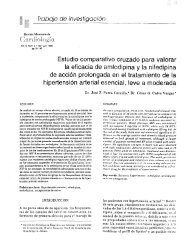- Page 2: DESIGUALDAD SOCIALY EQUIDAD EN SALU
- Page 5 and 6: Título originalDesigualdad Social
- Page 7 and 8: PARTE IIIDESIGUALDAD E INEQUIDAD EN
- Page 10 and 11: Decentralization And Equity:A Revie
- Page 12 and 13: multiple objectives, such as improv
- Page 14 and 15: functions that may include autonomy
- Page 16 and 17: 1.The public sector, which comprise
- Page 18 and 19: Moreover, Costa Rica, where the emp
- Page 20 and 21: esults of the decentralization in t
- Page 24: Infante, A., I. de la Mata, et al.
- Page 27 and 28: vida (Keppel et al., 2005). Existen
- Page 29 and 30: El rangoEs una medida que puede ser
- Page 31 and 32: Desviación media relativaEs un est
- Page 33 and 34: tecimiento dividido por su compleme
- Page 35 and 36: Índice de concentraciónEn este í
- Page 37 and 38: heterocedásticos, por lo que un mo
- Page 39 and 40: variables en salud que los signatar
- Page 41 and 42: igualdad de las distribuciones, asu
- Page 43 and 44: Referencias bibliograficasAnand, S.
- Page 45 and 46: LOW, A. (2004) Measuring the gap: q
- Page 48: PARTE IIgénero, discapacidady desi
- Page 51 and 52: O Brasil apresenta uma das maiores
- Page 53 and 54: ções no entendimento dos fatores
- Page 55 and 56: ciada no pós-parto. Informação r
- Page 57 and 58: porção de analfabetismo e melhor
- Page 59 and 60: 1996% 1998% 2000% TOTAL Razão de C
- Page 61 and 62: Tabela 3. (E1). Razão de chance de
- Page 63 and 64: Variáveis N Cesariana % RPb RPaj I
- Page 65 and 66: Figura 1(E2). Variações temporais
- Page 67 and 68: Tabela 1.E3. Taxas de cesariana e R
- Page 69 and 70: Tabela 2.E4. Características da ce
- Page 71 and 72: ReferênciasAlthabe, F., Belizan, J
- Page 73 and 74:
delivery rates and pregnancy outcom
- Page 75 and 76:
AntecedentesComo antecedentes en el
- Page 77 and 78:
por la Sociedad Argentina de Cardio
- Page 79 and 80:
Figura 2. Utilización de trombolí
- Page 81 and 82:
Figura 6. Mortalidad en el IAM seg
- Page 83 and 84:
Datos cualitativosLa información c
- Page 85 and 86:
en cardiología en sus servicios ac
- Page 87 and 88:
dado que las mujeres tienen arteria
- Page 89 and 90:
d) Médicos con más de 10 años de
- Page 91 and 92:
que el médico varón.Como puede ob
- Page 93 and 94:
y los buenos equipos de trabajo. La
- Page 95 and 96:
ConclusionesLa información analiza
- Page 97 and 98:
en las mujeres para realizar consul
- Page 99 and 100:
Es interesante observar que aun cua
- Page 101 and 102:
Arango Y, (2000) "Autocuidado de la
- Page 103 and 104:
Tajer D, Fernández AM, Cernadas J,
- Page 105 and 106:
Conceptos y definicionesConcepto de
- Page 107 and 108:
(ventaja / desventaja social, son o
- Page 109 and 110:
Surge entonces la perspectiva de la
- Page 111 and 112:
egistros), aunque es enorme y recog
- Page 113 and 114:
Gráfica 1. Discapacitados encuesta
- Page 115 and 116:
De esta forma se garantiza la impar
- Page 117 and 118:
Gradiente en contra de los estratos
- Page 119 and 120:
Gráfica 9. Mujeres discapacitadas
- Page 121 and 122:
de accidentalidad por grupos de eda
- Page 123 and 124:
La violencia como origen de la disc
- Page 125 and 126:
Braveman, Paula y Gruskin, Sofía (
- Page 128 and 129:
Las Desigualdades en Salud en Argen
- Page 130 and 131:
“Pobres siempre hubo”, fue una
- Page 132 and 133:
Investigaciones a nivel paísEl pa
- Page 134 and 135:
Figura 3. Relación entre razones d
- Page 136 and 137:
situación terminó con una saturac
- Page 138 and 139:
envejecida". Otra característica d
- Page 140 and 141:
Cuando fueron analizados los patron
- Page 142 and 143:
en el acceso a los medicamentos (Ca
- Page 144 and 145:
Universitaria, quizás sea un buen
- Page 146 and 147:
Instituto Nacional de Estadística
- Page 148:
de Lanús entre los años 1998 y 20
- Page 151 and 152:
condiciona las estrategias de atenc
- Page 153 and 154:
población abonaba una cobertura de
- Page 155 and 156:
Protección del capital físicoAlgu
- Page 157 and 158:
presenta en el cuadro 5 en el cual
- Page 159 and 160:
sugiere la existencia de subsidios
- Page 161 and 162:
Cuadro 8. Consultas Preventivas seg
- Page 163 and 164:
Implementación EconométricaLa pre
- Page 165 and 166:
ConclusionesEste trabajo retoma la
- Page 167 and 168:
Anexo ITabla de Equivalencias. Nece
- Page 169 and 170:
significado na perspectiva da saúd
- Page 171 and 172:
A Conferência Internacional sobre
- Page 173 and 174:
WHITEHEAD considera que nem todas a
- Page 175 and 176:
no esquema a seguir. Nela a equidad
- Page 177 and 178:
a equidade ao sugerir a distribuiç
- Page 179 and 180:
Isso, em certa medida, também expl
- Page 181 and 182:
têm influência sobre a saúde, qu
- Page 183 and 184:
Em correspondência com as taxas de
- Page 185 and 186:
o desenvolvimento do potencial de s
- Page 187 and 188:
Quadro 2. Unidades da Federação c
- Page 189 and 190:
política de saúde que desde o in
- Page 191 and 192:
Alocação de recursos financeiros
- Page 193 and 194:
maior carência de recursos (Norte
- Page 195 and 196:
Referências BibliográficasADAY, L
- Page 198 and 199:
Marginación Social y MortalidadEvi
- Page 200 and 201:
vida de las personas, sino también
- Page 202 and 203:
Cuadro 1. Numero de municipios y de
- Page 204 and 205:
La reducción más importante en n
- Page 206 and 207:
estrato de muy baja marginación- p
- Page 208 and 209:
Cuadro 5. Promedio de años de vida
- Page 210 and 211:
no pretende ser un análisis exhaus
- Page 212 and 213:
Indudablemente, la carencia de pol
- Page 214 and 215:
ecursos, por ejemplo- debe entender
- Page 216 and 217:
América Latina:Disparidad Social,
- Page 218 and 219:
desarrollar su máximo potencial y
- Page 220 and 221:
a la mitad (de 35,3% en 1990 a 17%
- Page 222 and 223:
Los datos también permiten constat
- Page 224 and 225:
cabría esperar que la cifra de ni
- Page 226 and 227:
Cuadro 3. Indicadores socioeconómi
- Page 228 and 229:
Cuadro 4. Indicadores seleccionados
- Page 230 and 231:
equidad como la ausencia de diferen
- Page 232 and 233:
Cuadro 9. Tasa de mortalidad de men
- Page 234 and 235:
años el número absoluto de niños
- Page 236:
PARTE IVeducación, políticas sani
- Page 239 and 240:
mediante el esfuerzo organizado de
- Page 241 and 242:
Poner a un mismo nivel de importanc
- Page 243 and 244:
dignidad humana e idénticos derech
- Page 245 and 246:
Dentro de este proceso educativo ex
- Page 247 and 248:
exige y fomenta la auto responsabil
- Page 249 and 250:
educación para el desarrollo de la
- Page 251 and 252:
tomar parte de la co munidad, en oc
- Page 253 and 254:
costumbres que logren cam bios de c
- Page 255 and 256:
formales y a través de los medios
- Page 257 and 258:
TORRES R. M. (2003) Educación popu
- Page 259 and 260:
justo e assim desejável, não se l
- Page 261 and 262:
tente de representar a condição d
- Page 263 and 264:
e’ afirmativa e foi corroborada p
- Page 265 and 266:
ou seja de diferenças sistemática
- Page 267 and 268:
as iniqüidades expressas na exposi
- Page 269 and 270:
Estas quatro dimensões devem orien
- Page 271 and 272:
xidade e’ através de uma matriz
- Page 273 and 274:
- renda familiar per capita igual o
- Page 275 and 276:
Finalmente, podemos ilustrar (como
- Page 277 and 278:
mogêneo esta cidade terá um compo
- Page 279 and 280:
falam do estado da arte da democrac
- Page 281 and 282:
deverão estar estruturados em torn
- Page 283 and 284:
A exigência de políticas pro equi
- Page 286:
Desigualdad Social y Equidad en Sal
















